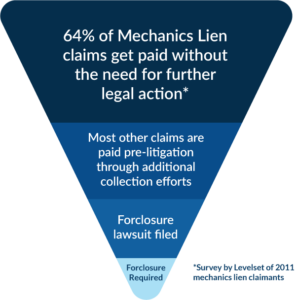
People often ask me what happens after a mechanics lien is filed. It’s an understandable question, because no one enjoys the process of filing a mechanics lien and creating potential conflict with someone you’ve worked with. This is what they’re really asking:
Is the mechanics lien going to work? Is it going to get me paid? Answer: Probably. While every situation is different, a mechanics lien is an incredibly effective tool to get a contractor paid for the work they have completed. Here are 17 ways that a mechanics lien helps you get paid.
Is it going to going to be worth the legal costs? Answer: Probably. Filing a mechanics lien alone can be very effective to recover payment. A few years ago, we conducted a survey that found that 64% of lien claims were paid within 3 months. If the amount you’re owed is less than the cost to take it to court, it might not be worth it. Of course, depending on your state, you might be able to include the legal fees in your claim.

Get free mechanics lien form
We're the mechanics lien experts. We offer forms made by attorneys and trusted by thousands.
Download FreeA pretty large supply company recently spoke with me about this as they were putting together a lien policy. Specifically, they were thinking about which accounts should be liened. And of those that still don’t pay, which liens should be foreclosed.
I
- You start with an aging account and you file a mechanics lien against it. (That action in itself reduces these accounts.)
- Of those that remain, you start collection efforts against the lien. This filters many of these accounts out of your open receivables report.
- Of those that remain, you initiate foreclosure actions.
Again, the initiating of these lien foreclosure procedures gets many additional accounts paid, which leaves your absolutely most difficult accounts in the foreclosure process. Take a look at the accompanying infographic to see how this process works.
After filing a lien on your outstanding accounts, it’s likely that you will recover at least some of those payments (in our survey, it worked 64% of the time). Collection actions will recover payment on another portion of your jobs. Filing a lawsuit is likely to get you paid on another percentage of your jobs. The small number left may require foreclosure in order to recover what you’re owed.
If you commit to the process your company can resolve a high percentage of its open receivables (For big picture overview of “the process,” check out this Guest Post I wrote for the Best Practices Construction Law Blog: Mechanics Lien and Bond Claims Best Practices).
Now, I explain this to folks a lot. During the recent phone call I realized that it would make a great infographic. It’s a simple funnel, but I think it’s a pretty accurate depiction of what happens to mechanics lien claims.